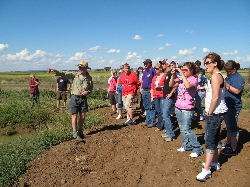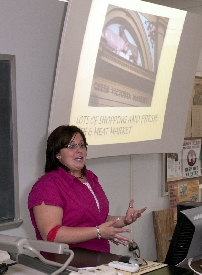Students Learn about Australia Ag Systems via Study Abroad
April 27, 2011

Pictured here are the Western Illinois University agriculture students touring a rice farm during the School of Ag's study abroad program to Australia over spring break 2011. According to WIU School of Agriculture Professor John Carlson, the rice farm is owned by Barry and Gillian Killop and is located near Leeton in New South Wales. "Barry [the individual pointing in the photo] talked to us extensively about irrigation and water allotments in Australia, where water is bought and sold routinely," Carlson noted.
[Download Print-Quality Image]
MACOMB, IL -- Adam Goodey, Mellisa Herwig and Alex Mahoney, all seniors studying agriculture at Western Illinois University, couldn't think of a better way to spend their spring breaks. While many college students in the U.S. headed to beaches for the annual tradition, these three took advantage of one of Western's many study abroad opportunities. They -- along with 21 other WIU ag students and two School of Agriculture faculty members, John Carlson and Marietta Loehrlein -- headed down under to spend their spring breaks learning about the agriculture systems, as well as the culture, of the Aussies.
When asked whether or not it was worth spending the spring break time off, as well as the money, to study, Goodey (Jacksonville, IL), like Herwig (Ashton, IL) and Mahoney (Pleasant Plains, IL), noted it, indeed, was.
"Absolutely. We each had to spend about $2,800 to go, but there is no way you could see everything that we did for that amount of money on your own. We saw a number of agriculture-production facilities, from Angus cattle to sheep farms to citrus and winery facilities. We traveled to Sydney, Charles Sturt University in Wagga Wagga, Griffith and Melbourne," Goodey explained. "I would have spent even more if I had to," he added.
Lest the spring-break fun enthusiasts think the students' trip was all work and no play, Goodey noted the group had plenty of time to take in and enjoy the sites, activities and even beaches of Australia.
"We got to go to a rugby game in Sydney, and we also took a two-hour walk along the coastline of Bondi Beach in South Wales," he said.
Mahoney added that they were able to visit an aboriginal cultural center in Sydney, which he found educational and enjoyable.
"There, we learned about the aboriginal people in Australia. We spent time learning about their history, and we actually got the chance to throw a boomerang. That was a really fun afternoon," he said.
Herwig added that seeing a kangaroo out in the wild was also memorable. But when the three were asked about the most memorable thing or experience about their spring break study abroad program, all three mentioned what they learned about the agriculture systems in Australia -- and how different they are from farming in the Midwest in the U.S. -- made a significant impact.
"Farmers and growers are allocated a certain amount of water each year," Herwig explained. "Here, we are usually blessed with adequate rain and fertile soil. But, typically, they can't get water from rain or irrigation. So some years, the farmers will choose not to put a crop in and will just sell their water -- they make a larger profit just selling their water than they do growing a crop. That is very different from what we experience here in Illinois," she added.
Herwig, Goodey and Mahoney all concurred, too, that taking the trip helped them broaden their individual horizons. They noted that seeing how others in the agriculture industry, in another part of the world, adapt to their environmental provisions or limitations provided them each with a perspective that will likely help them in their future professional careers.
"You may not see it right when you're there, but when you get back -- whether it's a week or a year -- you will likely remember, 'This is how they did things in Australia. I remember seeing that there,'" Goodey explained. "And, as far as employment, it could be an advantage, too. Maybe if someone who is interviewing you has been to Australia and that provides a common ground to talk about, or just that they see that you're willing to step outside your comfort area, it could help you get that job," he added.
Carlson, who is a professor in Western's School of Agriculture, often takes the opportunity to travel with students via WIU's study abroad offerings. In the past, he has traveled with students to Australia, as well as to Russia. He noted that the School of Ag will be taking another group of students to Russia in Spring 2012.
"We strongly encourage students to become involved in these trips. They not only expose them to different types of agriculture, but they also demonstrate to them how differently other people live. That knowledge is extremely important if we continue to actively compete against them and/or sell products to them. You have to know all you can about your customers and your competition, and you can't get that kind of information from an economic worksheet or from taking a vacation and just visiting another country. You have to be there, talk to them about what their problems are and see how they live," Carlson explained.
Emily Gorlewski, assistant director of the study abroad office at Western, noted, like many faculty members at WIU, Carlson is a big supporter of departmental and field- or discipline-oriented study abroad opportunities.
"As Dr. Carlson noted, the students who travel on these School of Agriculture programs learn a great deal about the industry in other countries. Due to the global marketplace, that's more important now than ever," she said. "And although many students might think they cannot afford a study broad program, there are ways to get financial assistance to help offset the cost."
While Goodey funded his own study abroad through savings, Herwig and Mahoney were able to raise some funds for their individual trips through business support in their respective hometowns of Ashton and Pleasant Plains. In addition, Gorlewski explained that the WIU Office of Study Abroad provides students with information that can help them take advantage of the study abroad opportunities offered.
"The Office of Study Abroad staff works with financial aid at Western to try to facilitate using the students' grants and loans for their study abroad experiences," Gorlewski noted. "We also have a lot of information about scholarships that students can apply for -- scholarships that are specifically for study abroad."
For more information about Western's many study abroad programs, contact Gorlewski at (309) 298-2504 or via email at EJ-Gorlewski@wiu.edu, or visit www.wiu.edu/studyabroad. For more information about the WIU School of Agriculture Russia Spring 2012 study abroad program, contact Carlson at (309) 298-1611 or via email at JP-Carlson@wiu.edu.
Posted By: Teresa Koltzenburg (WIUNews@wiu.edu)
Office of University Communications & Marketing


Connect with us: